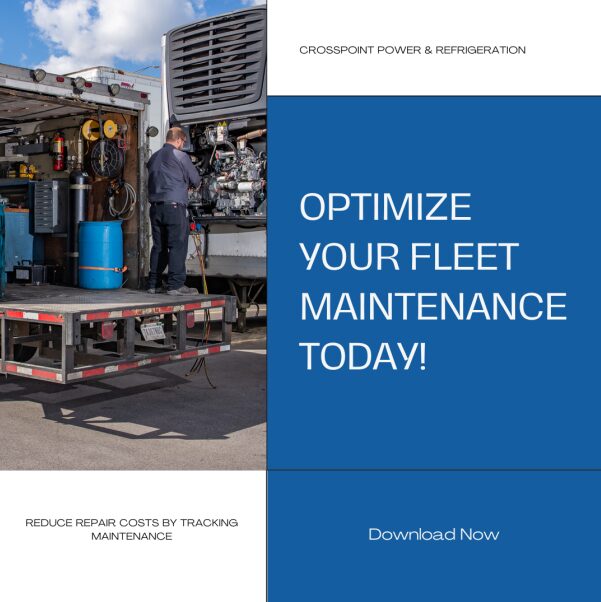When your engine fails or starts showing signs of serious wear, you’re faced with a big decision: Should you replace it with a rebuilt or a remanufactured engine?
While the two options may sound similar, there are significant differences that can affect the performance, lifespan, and reliability of your equipment—especially in commercial or industrial applications. At Crosspoint Power & Refrigeration, we help fleet owners, equipment operators, and service managers make informed choices that reduce downtime and deliver long-term value.
Key Takeaways
- Rebuilt engines replace only worn or failed components and may not meet OEM standards—making them better for low-budget, light-duty, or short-term use.
- Remanufactured engines are fully restored to OEM specifications (or better), tested under load, and built for long-term reliability in commercial or industrial applications.
- A rebuilt engine costs less upfront but may lead to shorter service life and higher risk of downtime.
- A remanufactured engine requires a higher initial investment but delivers better performance, longer lifespan, and warranty protection.
- For critical operations—such as reefers, gensets, and heavy equipment—remanufactured engines are generally the smarter choice.
Quick Comparison: Rebuilt vs. Remanufactured
Here’s a clear breakdown of repowered vs. rebuilt engines to help you decide what’s right for your needs.
| Feature | Rebuilt Engine | Remanufactured Engine |
| Scope of Work | Only worn/damaged parts replaced | Fully disassembled and restored to OEM specs |
| Tolerances/Specs | May vary from OEM standards | Meets or exceeds OEM standards |
| Testing | Minimal or manual testing | Full-load or dyno-tested |
| Parts Used | Mix of old/new parts | New or requalified OEM parts |
| Longevity | Moderate (depends on rebuilder) | High (like-new performance) |
| Cost | Lower upfront | Higher upfront, greater long-term value |
| Ideal Use Case | Budget repairs, light-duty use | Commercial, industrial, or critical operations |
What Is a Rebuilt Engine?
A rebuilt engine is an engine that’s been disassembled to the extent needed to replace failed or worn components—typically pistons, bearings, gaskets, or valves. The remaining internal parts are cleaned and reused if still functional.
Importantly, rebuilt engines are not required to meet original equipment manufacturer (OEM) standards. The tolerances and precision depend on the rebuilder’s tools, techniques, and quality control.
Pros of Rebuilt Engines:
- Lower cost upfront
- Shorter turnaround time
- Suitable for low-demand, non-critical applications
Cons:
- Inconsistent quality depending on the rebuilder
- Shorter lifespan
- Limited or no warranty
- Less reliable in demanding environments
What Is a Remanufactured Engine?
A remanufactured engine goes through a far more rigorous process. The engine is completely disassembled, cleaned, inspected, and rebuilt to meet or exceed the original OEM specifications.
This process includes:
- Precision machining and replacement of critical components
- Use of new or OEM-requalified parts
- Computer-aided performance testing (such as dynamometer testing)
- Quality assurance to ensure the engine runs like new
Pros of Remanufactured Engines:
- Factory-spec or better performance
- Tested for full-load conditions
- Longer service life
- Backed by warranties
- Ideal for heavy-duty use
Cons:
- Higher initial investment
- May require slightly longer lead time
Which Option Is Right for You?
Choosing between a rebuilt or remanufactured engine comes down to your specific application and priorities.
Go with a Rebuilt Engine if:
- You’re operating on a tight budget
- The equipment is for occasional or non-critical use
- You’re planning to sell the equipment in the near future
Go with a Remanufactured Engine if:
- You rely on the equipment daily and can’t afford breakdowns
- You want factory-level performance and reliability
- You’re investing in long-term operation and reduced maintenance
At Crosspoint Power & Refrigeration, we typically recommend remanufactured engines—especially in commercial applications like reefers, gensets, power units, and industrial equipment—where reliability and uptime are critical.
Why Choose Crosspoint Power for Remanufactured Engines?
We specialize in high-quality diesel engine solutions, including Yanmar and CRX remanufactured engines, built for industrial-strength durability and performance.
When you work with us, you get:
- Engines restored to OEM specs using high-end parts and processes
- Expert recommendations based on your workload and environment
- Access to reliable, tested products that minimize downtime
- In-shop and mobile service to support your operation before, during, and after the install
Whether you’re running a refrigeration unit, standby generator, or mobile equipment, we’ll help you choose the right engine with confidence.
Get an Estimate for a Remanufactured Engine
A rebuilt engine may seem like the more affordable option at first glance, but for most commercial and industrial applications, a remanufactured engine is the better long-term investment. It offers factory-grade performance, longer lifespan, and fewer surprises down the road.
Still unsure which way to go? Contact Crosspoint Power & Refrigeration. We’ll walk you through the options and match you with the best engine for your operation.
FAQs About Rebuilt vs Reman Engines
What’s the difference between rebuilt and remanufactured engines?
A rebuilt engine only replaces damaged parts, while a remanufactured engine is fully disassembled, machined, and restored to OEM specifications with new or requalified parts.
Are rebuilt engines reliable?
Rebuilt engines can be reliable for light-duty or occasional use, but their quality depends heavily on the rebuilder. They typically don’t last as long as remanufactured engines and may not come with a warranty.
Why are remanufactured engines more expensive?
They undergo a complete overhaul with OEM-level parts, precision machining, and performance testing. This process ensures reliability and longer service life, which lowers total cost of ownership.
How do I know which option is right for my equipment?
If you’re on a tight budget or planning to sell your equipment soon, a rebuilt engine may suffice. If you rely on your equipment daily and need uptime, a remanufactured engine is the better investment.
Does Crosspoint Power offer both rebuilt and remanufactured engines?
We specialize in remanufactured engines—particularly Yanmar and CRX models—because they deliver consistent, factory-grade performance for commercial and industrial applications.

